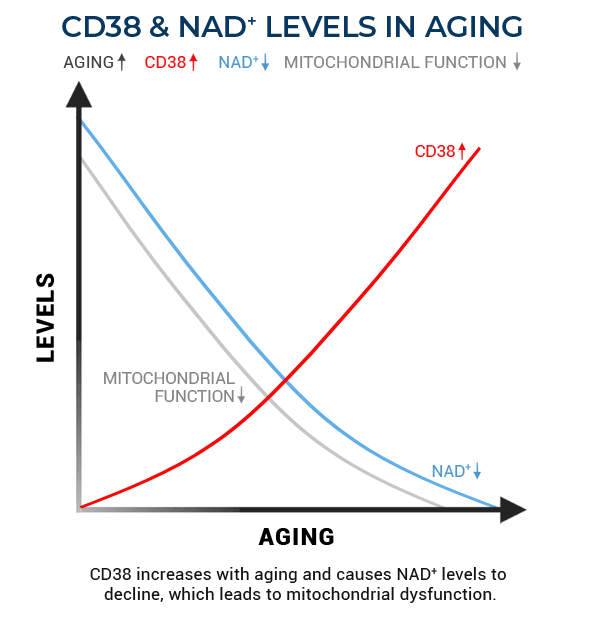CD38 Deficiency Alleviates Ang II-Induced Vascular Remodeling By Inhibiting Small Extracellular Vesicle-Mediated Vascular Smooth Muscle Cell Senescence In Mice (Lu Gan, June 2021)

In this study, researchers investigated the impact of NMN supplementation and CD38 inhibition on the cardiovascular function in mice.
Declining NAD+ levels are a major contributor to cardiovascular disease in mice. It was demonstrated that raising NAD+ levels through NMN supplementation or by CD38 inhibition can restore cardiovascular function in mice.
The improvement in NAD+ levels in the mice led to lower rates of senescent cells in the blood vessels, resulting in an alleviation of hypertension & was correlated with improved cardiovascular function.
“Our results provide strong evidence that CD38 inhibition or NAD supplementation may serve as potential therapeutic strategies for age-related diseases.”
CD38 Induced NAD+ Decline is Linked to Cardiovascular Disease
Nicotinamide adenine dinucleotide (NAD+) is an essential coenzyme that is required for life, cellular functions and the creation of energy. CD38 is the main enzyme responsible for the degradation of NAD+ levels. CD38 induced NAD+ decline is closely linked to cardiovascular diseases, such as atherosclerosis (hardening and narrowing of arteries), hypertension and heart failure.
“CD38 as the main enzyme involved in the degradation of the NAD precursor nicotinamide mononucleotide (NMN) in vivo, indicating that CD38 has a key role in the modulation of NAD-replacement therapy for aging and metabolic diseases.” (Source)
Senescent Cells Linked to Cardiovascular Disease
The risk for cardiovascular diseases greatly increases with age. Senescent cell accumulation is directly involved in the progression of cardiovascular diseases & other age-related illnesses. When cells become damaged and can no longer take on any added damage or stress, they become senescent and stop growing and replicating. They are known as “zombie cells,” as they don’t die off, and their accumulation contributes to inflammation and diseases.
Arterial Senescent Cells Are Associated with Atherosclerosis
Senescent cells within the arteries actively drive the chronic inflammation associated with atherosclerosis.
To reverse the inflammation associated with the hardening and narrowing of the arteries, getting rid of the senescent cells is vital.
“A younger person’s immune system is healthy and is able to clear the damaged cells, but as people age, they aren’t cleared as effectively and they accumulate causing potential problems.” (Source)
Study Treatment Groups
To assess the effects of CD38 inhibition and NMN supplementation, there were two treatment groups of mice studied:
- Mice lacking in CD38, either through genetically removing it or by blocking it with an inhibitor
- Mice given Nicotinamide Mononucleotide (NMN) supplementation for 4-weeks
Results of NMN Supplementation – Alleviation of Hypertension & Improved Cardiovascular Function
Researchers studied how NMN supplementation would impact vascular smooth muscle cell (VSMC) senescence. VSMC are the major cells in the media layer of the arteries and they are critical to the integrity and health of the arterial wall.
Through supplementation with NMN, mice had increased NAD+ levels, which led to lower rates of senescent cells in the blood vessels. As a result, it led to an alleviation of hypertension and was correlated with improved cardiovascular function and disease prevention in the mice.
“In vivo oral administration of NMN to elevate NAD levels alleviated Ang II-induced blood pressure elevation.”
Results of CD38 Inhibition – Arterial Improvements & 50% NAD+ Increase in Aorta Tissue
In mice with CD38 inhibition, it was shown that they had a 50% increase in intracellular NAD+ levels of whole aorta tissue. When researchers increased levels of CD38, the VSMC senescence significantly increased.
The vascular media thickness and the media-to-lumen ratio in those mice administered with the CD38 inhibitor were greatly reduced (by between 21-30%).
Mitigation of Senescent Cells & Blood Pressure Improvements
With either CD38 deficiency or NAD+ supplementation, there was a marked mitigation in Angiotensin II-induced vascular senescence. Angiotension II is a protein involved in increasing blood pressure.
The administration of the CD38 inhibitor led to a significant reduction in the caudal arterial pressure, systolic blood pressure and diastolic blood pressure.
“In the current study, we demonstrated that CD38 not only contributed to vascular remodeling in hypertension but also played a detrimental pro-senescence role in VSMC senescence, further confirming the correlation of NAD decline and aging.”
Conclusion
The study demonstrated that NMN supplementation and CD38 inhibition in the mice led to improved NAD+ levels, diminishment of senescent cells, lower blood pressure, improved arterial function and a reversal of inflammation associated with hardening and narrowing of the arteries.
References
Zombie Cells – University of Minnesota Medical School


